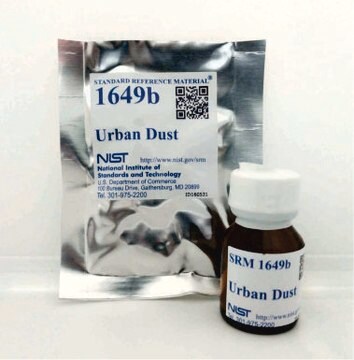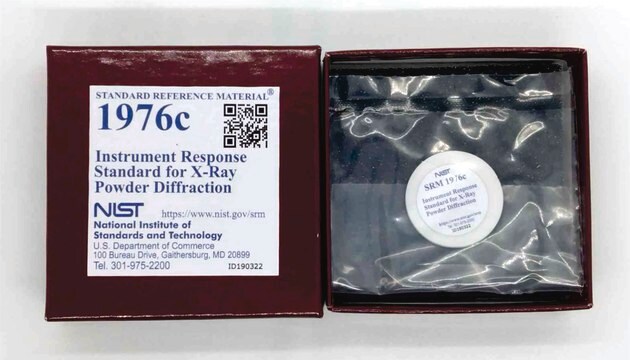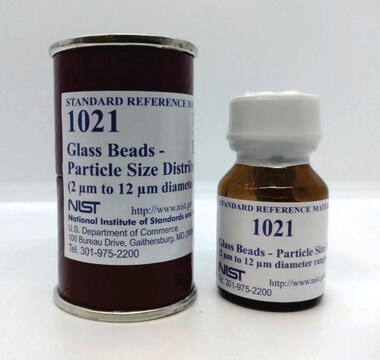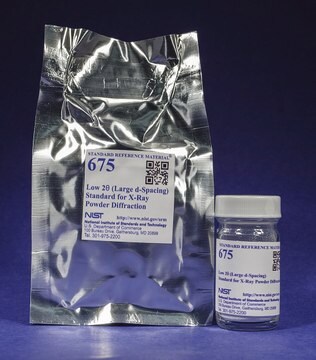NIST1879A
Respirable cristobalite
NIST® SRM® 1879a, quantitative X-ray powder diffraction standard
Synonim(y):
Cristobalite
Zaloguj sięWyświetlanie cen organizacyjnych i kontraktowych
About This Item
Polecane produkty
Formularz
powder
opakowanie
pkg of 5 g
producent / nazwa handlowa
NIST®
InChI
1S/O2Si/c1-3-2
Klucz InChI
VYPSYNLAJGMNEJ-UHFFFAOYSA-N
Opis ogólny
Zastosowanie
- Inhalable Porous Particles for Lung Drug Delivery: Research on inhalable porous particles of cristobalite demonstrates significant advancements in respiratory drug delivery systems, specifically targeting tuberculosis. These findings emphasize the crucial role of respirable cristobalite in enhancing the efficacy of pulmonary treatments (Campos Pacheco et al., 2024).
- Impact of Crystalline Silica on Pulmonary Health: A study exploring the effects of crystalline silica-induced inflammation and autoimmunity highlights the importance of respirable cristobalite in understanding occupational health risks and developing protective strategies against lung diseases (Heine et al., 2024).
- Workplace Exposure to Respirable Dust: Analysis of respirable dust and cristobalite concentrations in workers at a brick kiln in Nepal provides insights into occupational exposure and its health implications, aiding in the development of better industrial hygiene practices (Beard et al., 2024).
- Asbestos and Cristobalite Analysis: Research on distinguishing asbestos from its nonasbestiform analogues, including cristobalite, through FTIR and multivariate data analysis, underscores the significance of high-purity cristobalite in environmental and material safety studies (Lee et al., 2024).
- Occupational Exposure Limits Comparison: A comparative study on the occupational exposure limits of coal dust, which includes cristobalite, between China and other countries, highlights the global variations and the need for standardized safety protocols in industrial settings (Li and Zhu, 2024).
Informacje prawne
NIST is a registered trademark of National Institute of Standards and Technology
SRM is a registered trademark of National Institute of Standards and Technology
Ta strona może zawierać tekst przetłumaczony maszynowo.
Hasło ostrzegawcze
Danger
Zwroty wskazujące rodzaj zagrożenia
Zwroty wskazujące środki ostrożności
Klasyfikacja zagrożeń
STOT RE 1 Inhalation
Organy docelowe
Lungs
Kod klasy składowania
6.1D - Non-combustible acute toxic Cat.3 / toxic hazardous materials or hazardous materials causing chronic effects
Klasa zagrożenia wodnego (WGK)
nwg
Temperatura zapłonu (°F)
Not applicable
Temperatura zapłonu (°C)
Not applicable
Wybierz jedną z najnowszych wersji:
Certyfikaty analizy (CoA)
Lot/Batch Number
Przepraszamy, ale COA dla tego produktu nie jest aktualnie dostępny online.
Proszę o kontakt, jeśli potrzebna jest pomoc Obsługa Klienta
Masz już ten produkt?
Dokumenty związane z niedawno zakupionymi produktami zostały zamieszczone w Bibliotece dokumentów.
Nasz zespół naukowców ma doświadczenie we wszystkich obszarach badań, w tym w naukach przyrodniczych, materiałoznawstwie, syntezie chemicznej, chromatografii, analityce i wielu innych dziedzinach.
Skontaktuj się z zespołem ds. pomocy technicznej





